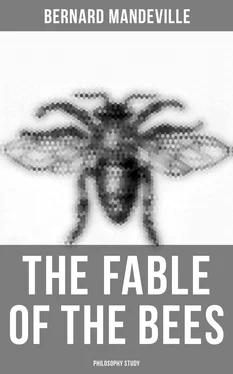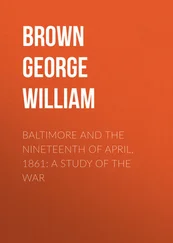The mask hypocrisy’s sitting down,
From the great statesman to the clown:
And in some borrow’d looks well known,
Appear’d like strangers in their own.
The bar was silent from that day; 250
For now the willing debtors pay,
Ev’n what’s by creditors forgot;
Who quitted them that had it not.
Those that were in the wrong, stood mute,
And dropt the patch’d vexatious suit: 255
On which since nothing else can thrive,
Than lawyers in an honest hive,
All, except those that got enough,
With inkhorns by their sides troop’d off.
Justice hang’d some, set others free; 260
And after gaol delivery,
Her presence being no more requir’d,
With all her train and pomp retir’d.
First march’d some smiths with locks and grates,
Fetters, and doors with iron plates: 265
Next gaolers, turnkeys and assistants:
Before the goddess, at some distance,
Her chief and faithful minister,
’Squire Catch, the law’s great finisher,
Bore not th’ imaginary sword, 270
But his own tools, an ax and cord:
Then on a cloud the hood-wink’d fair,
Justice herself was push’d by air:
About her chariot, and behind,
Were serjeants, bums of every kind, 275
Tip-staffs, and all those officers,
That squeeze a living out of tears.
Though physic liv’d, while folks were ill,
None would prescribe, but bees of skill,
Which through the hive dispers’d so wide, 280
That none of them had need to ride;
Wav’d vain disputes, and strove to free
The patients of their misery;
Left drugs in cheating countries grown,
And us’d the product of their own; 285
Knowing the gods sent no disease,
To nations without remedies.
Their clergy rous’d from laziness,
Laid not their charge on journey-bees;
But serv’d themselves, exempt from vice, 290
The gods with pray’r and sacrifice;
All those, that were unfit, or knew,
Their service might be spar’d, withdrew:
Nor was their business for so many,
(If th’ honest stand in need of any,) 295
Few only with the high-priest staid,
To whom the rest obedience paid:
Himself employ’d in holy cares;
Resign’d to others state-affairs.
He chas’d no starv’ling from his door, 300
Nor pinch’d the wages of the poor:
But at his house the hungry’s fed,  The hireling finds unmeasur’d bread, The needy trav’ller board and bed.
The hireling finds unmeasur’d bread, The needy trav’ller board and bed.
Among the king’s great ministers, 305
And all th’ inferior officers,
The change was great; for frugally
They now liv’d on their salary:
That a poor bee should ten times come
To ask his due, a trifling sum, 310
And by some well-hir’d clerk be made
To give a crown, or ne’er be paid,
Would now be call’d a downright cheat,
Though formerly a perquisite.
All places manag’d first by three, 315
Who watch’d each other’s knavery
And often for a fellow-feeling,
Promoted one another’s stealing,
Are happily supply’d by one,
By which some thousands more are gone. 320
No honour now could be content,
To live and owe for what was spent;
Liv’ries in brokers shops are hung,
They part with coaches for a song;
Sell stately horses by whole sets; 325
And country-houses, to pay debts.
Vain cost is shunn’d as much as fraud;
They have no forces kept abroad;
Laugh at th’ esteem of foreigners,
And empty glory got by wars; 330
They fight but for their country’s sake,
When right or liberty’s at stake.
Now mind the glorious hive, and see
How honesty and trade agree.
The show is gone, it thins apace; 335
And looks with quite another face.
For ’twas not only that they went,
By whom vast sums were yearly spent;
But multitudes that liv’d on them,
Were daily forc’d to do the same. 340
In vain to other trades they’d fly;
All were o’er-stock’d accordingly.
The price of land and houses falls;
Mirac’lous palaces, whose walls,
Like those of Thebes, were rais’d by play, 345
Are to be let; while the once gay,
Well-seated household gods would be
More pleas’d to expire in flames, than see
The mean inscription on the door
Smile at the lofty ones they bore. 350
The building trade is quite destroy’d,
Artificers are not employ’d;
No limner for his art is fam’d,
Stone-cutters, carvers are not nam’d.
Those, that remain’d, grown temp’rate, strive, 355
Not how to spend, but how to live;
And, when they paid their tavern score,
Resolv’d to enter it no more:
No vintner’s jilt in all the hive
Could wear now cloth of gold, and thrive; 360
Nor Torcol such vast sums advance,
For Burgundy and Ortolans;
The courtier’s gone that with his miss
Supp’d at his house on Christmas peas;
Spending as much in two hours stay, 365
As keeps a troop of horse a day.
The haughty Chloe, to live great,
Had made her husband rob the state:
But now she sells her furniture,
Which th’ Indies had been ransack’d for; 370
Contracts the expensive bill of fare,
And wears her strong suit a whole year:
The slight and fickle age is past;
And clothes, as well as fashions, last.
Weavers, that join’d rich silk with plate, 375
And all the trades subordinate,
Are gone; still peace and plenty reign,
And every thing is cheap, though plain:
Kind nature, free from gard’ners force,
Allows all fruits in her own course; 380
But rarities cannot be had,
Where pains to get them are not paid.
As pride and luxury decrease,
So by degrees they leave the seas.
Not merchants now, but companies 385
Remove whole manufactories.
All arts and crafts neglected lie;
Content, the bane of industry,
Makes ’em admire their homely store,
And neither seek nor covet more. 390
So few in the vast hive remain,
The hundredth part they can’t maintain
Against th’ insults of numerous foes;
Whom yet they valiantly oppose:
’Till some well fenc’d retreat is found, 395
And here they die or stand their ground.
No hireling in their army’s known;
But bravely fighting for their own,
Their courage and integrity
At last were crown’d with victory. 400
They triumph’d not without their cost,
For many thousand bees were lost.
Harden’d with toils and exercise,
They counted ease itself a vice;
Which so improv’d their temperance; 405
That, to avoid extravagance,
They flew into a hollow tree,
Blest with content and honesty.
Table of Contents
Then leave complaints: fools only strive
To make a great an honest hive. 410
T’ enjoy the world’s conveniences,
Be fam’d in war, yet live in ease,
Without great vices, is a vain
Eutopia seated in the brain.
Fraud, luxury, and pride must live, 415
While we the benefits receive:
Hunger’s a dreadful plague, no doubt,
Yet who digests or thrives without?
Do we not owe the growth of wine
To the dry shabby crooked vine? 420
Which, while its shoots neglected stood,
Chok’d other plants, and ran to wood;
But blest us with its noble fruit,
As soon as it was ty’d and cut:
So vice is beneficial found, 425
When it’s by justice lopp’d and bound;
Читать дальше

 The hireling finds unmeasur’d bread, The needy trav’ller board and bed.
The hireling finds unmeasur’d bread, The needy trav’ller board and bed.










